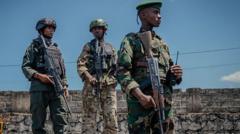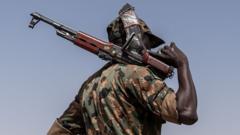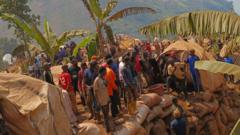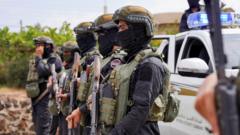Rwanda's decision to leave the Eccas highlights the escalating diplomatic strains in Central Africa as accusations of military aggression loom large.
**Rwanda Exits Central African Bloc Amidst Conflict over DR Congo Allegations**

**Rwanda Exits Central African Bloc Amidst Conflict over DR Congo Allegations**
Rwanda's withdrawal from the Economic Community of Central African States is fueled by tensions surrounding its alleged support for rebel groups in the Democratic Republic of Congo.
Rwanda has announced its withdrawal from the Economic Community of Central African States (Eccas) in light of escalating tensions regarding its involvement in the ongoing conflict in the eastern Democratic Republic of Congo (DRC). Initially positioned to assume the role of chairman, Rwanda's accession was blocked during a recent summit held in Equatorial Guinea.
Citing their exclusion from leadership within Eccas as "deliberately ignored," the Rwandan government expressed frustration, stating that it no longer sees merit in remaining within an organization that deviates from its core principles. The ongoing power struggle comes as diplomatic initiatives, mediated by the United States, continue in an effort to formulate a peace plan between Rwanda and the DRC, with a tentative signing anticipated in the coming weeks.
At the heart of the dispute lies the DRC's accusations of Rwandan military support for the M23 rebel group, which has gained significant ground in eastern DRC by capturing pivotal cities such as Goma and Bukavu. The Congolese government, supported by both US and French assessments, has indicated that Rwandan troops are allegedly involved directly in combat alongside these rebels. A UN report from last year suggested numbers as high as 4,000 Rwandan troops engaged in the conflict.
In light of these accusations, Eccas leaders at the recent summit not only condemned Rwanda's actions but also mandated the withdrawal of its forces from Congolese territory. The decision has resulted in Equatorial Guinea holding onto the chairmanship role, much to Rwanda's chagrin. Congolese officials have called for a robust regional response against Rwanda, insisting that violations of the communal agreements warrant immediate action.
Rwanda, on the other hand, has continuously refuted these allegations, claiming instead that its military presence is strictly defensive, intended to secure its borders against the spillover of the conflict. This is not the first time Rwanda has exited Eccas, previously withdrawing in 2007 but later rejoining. The current diplomatic fallout raises concerns over the stability and unity of regional partnerships as Central Africa grapples with ongoing conflicts and the implications of foreign intervention.
Citing their exclusion from leadership within Eccas as "deliberately ignored," the Rwandan government expressed frustration, stating that it no longer sees merit in remaining within an organization that deviates from its core principles. The ongoing power struggle comes as diplomatic initiatives, mediated by the United States, continue in an effort to formulate a peace plan between Rwanda and the DRC, with a tentative signing anticipated in the coming weeks.
At the heart of the dispute lies the DRC's accusations of Rwandan military support for the M23 rebel group, which has gained significant ground in eastern DRC by capturing pivotal cities such as Goma and Bukavu. The Congolese government, supported by both US and French assessments, has indicated that Rwandan troops are allegedly involved directly in combat alongside these rebels. A UN report from last year suggested numbers as high as 4,000 Rwandan troops engaged in the conflict.
In light of these accusations, Eccas leaders at the recent summit not only condemned Rwanda's actions but also mandated the withdrawal of its forces from Congolese territory. The decision has resulted in Equatorial Guinea holding onto the chairmanship role, much to Rwanda's chagrin. Congolese officials have called for a robust regional response against Rwanda, insisting that violations of the communal agreements warrant immediate action.
Rwanda, on the other hand, has continuously refuted these allegations, claiming instead that its military presence is strictly defensive, intended to secure its borders against the spillover of the conflict. This is not the first time Rwanda has exited Eccas, previously withdrawing in 2007 but later rejoining. The current diplomatic fallout raises concerns over the stability and unity of regional partnerships as Central Africa grapples with ongoing conflicts and the implications of foreign intervention.





















